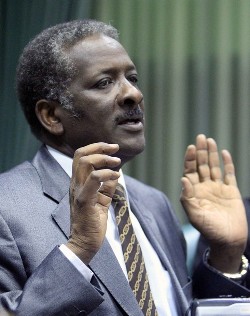Sudanese government’s plan to lift fuel subsidies meets rare resistance by lawmakers
December 12, 2011 (KHARTOUM) – The Sudanese national assembly on Monday refused to approve a plan put forward by the government to remove fuel subsidies as part of the 2012 budget.

But lawmakers rejected the warning and urged the finance minister to look for alternatives other than lifting fuel subsidies.
They called for further cutting salaries of government officials and assigning only one vehicle for each.
“I am with you in [having] one car for the minister and reducing constitutional [officials] salaries because we are in a bind and we need to economize,” Abdel-Rasool said.
The head of the ruling National Congress Party (NCP) bloc in parliament Ghazi Salah al-Deen also expressed opposition to Abdel-Rasool’s plan saying that it is not convincing and suggested that corruption is one issue that need to be addressed urgently.
But the former finance minister Al-Zubeir Ahmed al-Hassan defended Abdel-Rasool saying that a successful economist is one who does not bend in the face of storms.
“We need to clearly tell citizens that this oil is not yours” al-Hassan said and claimed that the government imports it for $117 per barrel and sells it for $49.
Last January the government partially lifted subsidies on petroleum products in anticipation of South Sudan’s imminent secession which became official last July. The south produced the vast majority of the country’s oil before the breakup.
The central bank governor Mohamed Khair al-Zubeir in an interview with Reuters last October said that fuel subsidies “are big burden for the state”.
“So far we didn’t notice the difference, subsidies were no problem because the country had oil … [but] we cannot pay this anymore,” he said.
Ordinary Sudanese have been hit hard by years of conflict, high inflation, U.S. trade sanctions, corruption and high unemployment.
Annual inflation hit 19.1 percent in November, up from 15 percent in June. The Sudanese pound has fallen on the black market since July due to a lack of dollars as oil revenues dried up.
(ST)
